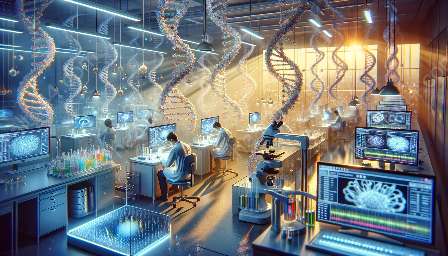Genetic disorders are a complex and diverse group of illnesses that arise from abnormalities in an individual's genetic makeup. Understanding these disorders is crucial for individuals, healthcare providers, and researchers in the fields of genetics, health education, and medical training. This topic cluster will explore genetic disorders in depth, covering their implications for health and well-being, genetic mechanisms contributing to their development, and the role of genetics and medical training in diagnosis, treatment, and prevention.
The Basics of Genetic Disorders
Genetic disorders are conditions caused by abnormalities in an individual's genome, including mutations, deletions, or duplications of genetic material. These disorders can be inherited from one or both parents or may occur spontaneously due to genetic mutations. There are thousands of documented genetic disorders, each with its unique set of symptoms, patterns of inheritance, and underlying genetic causes.
Types of Genetic Disorders
Genetic disorders can be broadly categorized into several groups, including single-gene disorders, chromosomal disorders, and multifactorial disorders. Single-gene disorders, such as cystic fibrosis and sickle cell anemia, result from mutations in a single gene. Chromosomal disorders, such as Down syndrome and Turner syndrome, arise from abnormalities in the structure or number of chromosomes. Multifactorial disorders, including heart disease and diabetes, result from a combination of genetic and environmental factors.
The Impact of Genetic Disorders
Genetic disorders can have significant implications for an individual's health and quality of life. They may lead to developmental delays, physical disabilities, intellectual disabilities, and an increased risk of certain medical conditions. The impact of genetic disorders extends beyond the affected individuals, as their families and communities may also experience emotional, financial, and social challenges in providing care and support.
Genetic Mechanisms and Causes
The development of genetic disorders involves a complex interplay of genetic and environmental factors. Understanding the underlying genetic mechanisms contributing to these disorders is essential for advancing research, diagnosis, and treatment. Genetic mutations, gene expression abnormalities, and epigenetic modifications are among the key factors contributing to the development of genetic disorders.
Genetics and Medical Training
Healthcare providers, genetic counselors, and researchers involved in genetics and medical training play a crucial role in addressing genetic disorders. Their expertise is pivotal in diagnosing genetic conditions, providing genetic counseling to patients and families, and developing innovative therapies based on advances in genetic research. A comprehensive understanding of genetic disorders is fundamental for medical students and healthcare professionals to deliver personalized and effective care.
Impact on Health Education and Public Awareness
Education and awareness initiatives are essential for disseminating information about genetic disorders, addressing misconceptions, and promoting genetic testing and counseling. Health education programs aimed at the general public can facilitate early detection, ensure informed decision-making, and reduce stigma associated with genetic disorders. Additionally, raising public awareness can foster support for research and healthcare policies focused on genetic disorders.
Future Directions in Genetic Research and Healthcare
Advancements in genetic research, including genome sequencing and gene editing technologies, hold promise for the prevention and treatment of genetic disorders. Interdisciplinary collaboration across genetics, medical training, and healthcare is crucial for advancing precision medicine and developing targeted therapies for individuals affected by genetic disorders. Moreover, ongoing efforts to integrate genetic education into medical curricula and professional development programs can empower healthcare professionals to address the complex challenges posed by genetic disorders.
Conclusion
Understanding genetic disorders is a multifaceted endeavor that intersects with genetics, health education, and medical training. By delving into the complexities of genetic disorders, their impact on individuals and communities, and the role of genetics in healthcare, we can strive towards comprehensive approaches to prevention, diagnosis, and treatment. Embracing the evolving landscape of genetic research and healthcare, we can pave the way for improving the well-being of individuals affected by genetic disorders and contributing to the advancement of medical training and genetics as intertwined disciplines.


